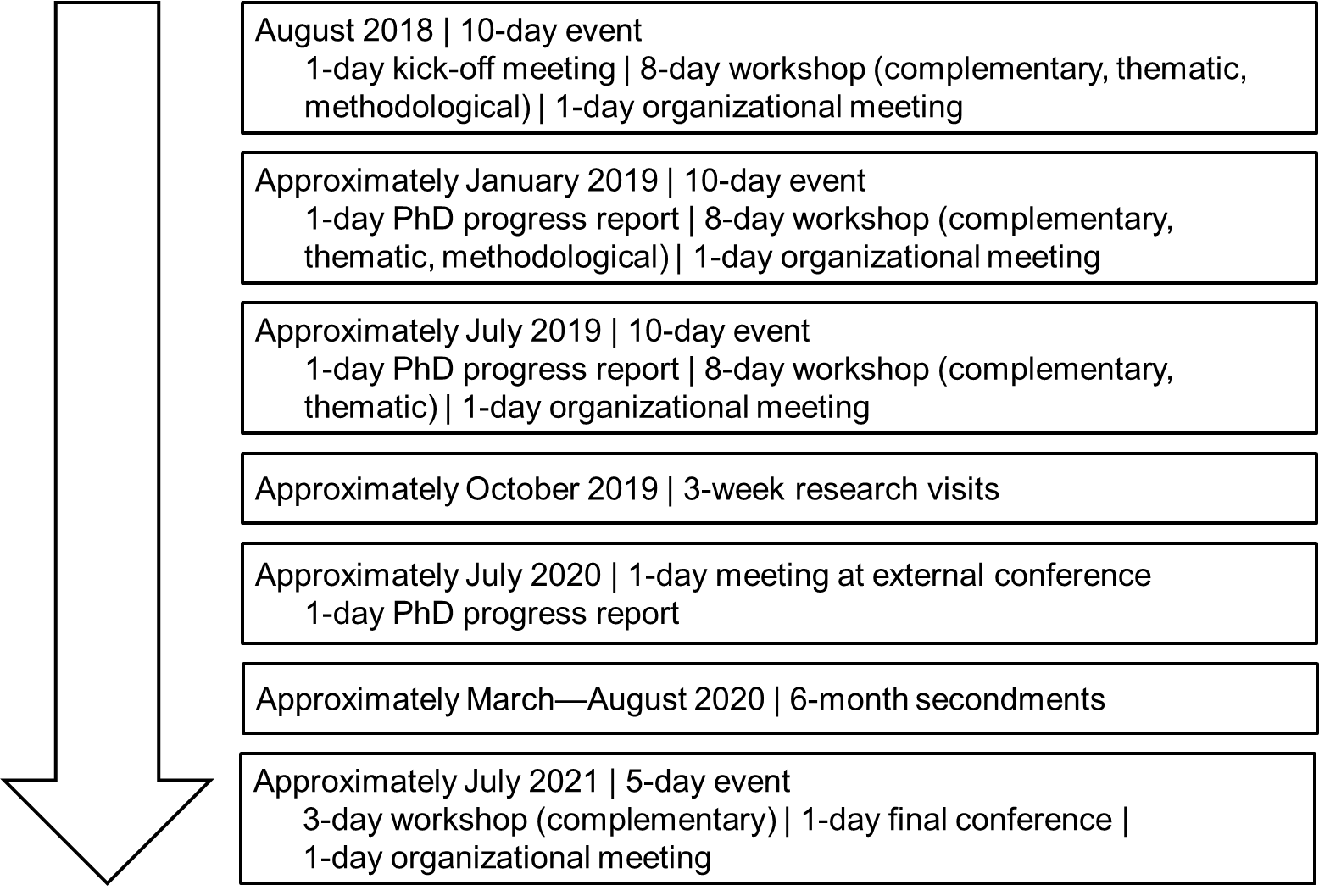Training Aims
The training provided by OCCAM educates a new generation of staff with the capacity to advise and influence educational policies in European countries and lead future international studies. The OCCAM graduates will be able to advise policy actors, review and guide the design of future international comparative studies, and conduct further research on modern educational systems to promote research-based reforms. Furthermore, OCCAM aims to reignite innovation by linking academic research to an entrepreneurial spirit and a greater inter- and multidisciplinary focus on educational practices.
The consortium establishes an international, inter- and multidisciplinary innovative training program through lectures and research, broadening the traditional academic training setting by including non-academic partners. The full integration of these partners will stimulate the entrepreneurial and research skills of early-stage researchers (ESRs) and their employability, and reinforce the innovative capacity of the EU.
The training program produces inter- and multidisciplinary and intersectoral knowledge on the effects of educational policy or policy-related issues on student learning and the emergence of educational inequality (read more on the research framework). In line with this goal, the training program lays the conceptual and methodological foundations that enables 15 early-stage researchers (read more on the individual projects) to apply a holistic perspective to their chosen specific contexts. This will be achieved by utilizing the training capacities of all the partners to train all the PhD students, ensuring the integration of extensive scientific expertise. Due to the interdisciplinary composition of the network, the training provided by OCCAM is multidisciplinary in nature and integrates a variety of specific approaches. Senior researchers from the fields of economics, econometrics, education, political science, psychology, psychometrics, and sociology come together to form a truly inter- and multidisciplinary network.
As all network members contribute to courses offered within the network-wide workshops, each PhD student becomes acquainted with concepts and analytical approaches from different disciplines. Furthermore, external leading experts are invited to contribute their expertise to OCCAM’s local and network-wide training sessions. To ensure the highest standard of training, a structured program is offered to all early-stage researchers. The basis for a meaningful collective training program is that all PhD students participate in an OCCAM research project with an individual research topic that is predefined in the ESR announcement. In addition to the scientific research work, early-stage researchers complete a study program composed of obligatory network-wide training activities and local training courses.
Contents of the Structured Training Program
The content of the structured training program can be devided in three categories:
 |
Analytical/Conceptual Skills Through Inter- and Multidisciplinary TrainingsAnalytical/conceptual skills relate to the development of an inter- and multidisciplinary perspective on educational effectiveness and educational outcomes in relation to the individual research project. The educational effectiveness research serves as a common framework in which to combine the different perspectives. The training aims at building up skills in analyzing the multilevel nature of educational systems and the dynamic relations between the individual, class, school, regional, and country levels. An overarching aim of OCCAM is to recognize the emergence of educational inequality. We will also scrutinize the role of international studies themselves. Do comparative studies lead to a harmonization of curricula around the world? What are the alternative educational outcomes (e.g., citizenship)? |
 |
Methodological Training on Databases, Educational Measurement, and Causal AnalysisMethodological skill training aims to enable the early-stage researchers to understand and design international comparative studies, to analyze the databases from international large-scale assessment studies, and to give them the methodological foundations to understand effective sampling designs (weights, replication techniques like jack-knife variance estimation) and testing (psychometrics). Furthermore, the training in methods covers the potential outcome framework, the limitations of traditional conditioning techniques, and alternative approaches for identifying causal effects (e.g., instrumental variable regression, differences-in-differences). The training highlights the mediating, moderating, and direct causal effects of educational policies. |
 |
Complementary and Transferable Skills Useful in Academic and Non-Academic EnvironmentsComplementary and transferable skills training completes the training program and increases the PhD students’ employability. By taking special courses as part of network-wide training and engaging in management tasks (in relation to their own project, at events at local and national level, and at network-wide events) the early-stage researchers receive valuable training in research ethics, gender awareness, project design, and management skills. The intersectoral composition of the consortium is also beneficial for training the PhD students in dissemination, presentation, and writing skills (both academically and for a wider audience of policy makers, politicians, and the public). OCCAM also aims to prepare the early-stage researchers for a career upon obtaining their PhDs. Training in grant writing is one of the aspects included in the workshops. National and international programs that seek to support young postdocs will be announced at the end of the action, and the OCCAM early-stage researchers will be supported in writing proposals for these calls. |
Structure of the Training Program
The network provides all early-stage researchers with a carefully devised, but flexible, training program that can be adapted to individual needs. Supported by network-wide events and individually tailored training opportunities, the PhD students receive rigorous training and supervision in performing cutting-edge research. A career development plan will be prepared for each fellow in accordance with her or his supervisor and will include training, planned secondments and outreach activities in partner institutions of the network. The training program lasts three years and include different types of training, knowledge transfer, and mobility.

Network-Wide Training Events
The training program includes four network-wide training events. The OCCAM senior researchers from the partner institutions provide thematic workshops, methodology seminars, and complementary-skills training specifically for the Phd students, either organized by their own departments or by inviting external experts. The network-wide meetings last up to 10 days and combine scientific and complementary training with meetings for project management, organization, and feedback on the early-stage reseachers’ progress in the PhD projects. The PhD students’ progresses in their research and dissertation work is presented and discussed at two training events and separately at a special meeting at an external conference.
Secondments and Research Visits
Early-stage researchers are encouraged to make full use of the research capacities of the network and the participating institutes, and, in particular, of the expertise of the researchers involved in the network. The PhD students undertake secondments of six months at another partner institute in order, for example, to receive training in database design or in a specialized method, or to consult a national expert (see PhD project descriptions for details). In addition, the early-stage researchers make at least one research visit (of about three weeks duration) to another partner institution. The destinations will be assigned based on the PhD students’ project-related needs and with the aim of maximizing communication and cooperation with various environments. The exposure to different international, interdisciplinary, and intersectoral environments maximizes transferable skill improvement and thereby increases their employability. Further short stays may be planned later if this meets the needs of the individual project. The secondments and visit(s) do not only expose the researchers to different theoretical and empirical approaches, but also foster their integration into the network of researchers and increase their visibility within the wider academic community.
Local Training
At their host institutions, the early-stage researchers have the opportunity to participate in regular local PhD training programs and measures of PhD supervision. These include the participation in local colloquia and seminars, as well as in external trainings like pre-conferences of international symposia.
Presentations at Conferences
The early-stage researchers present their research findings of their dissertations to a wider audience at a number of international conferences. The consortium members submit thematically focused symposia to different international high-ranking conferences in order to provide all PhD students with the opportunity to present their research to other leading researchers across Europe and the world. The students actively participate in the conferences in the second and third years of their dissertations. Furthermore, the final OCCAM conference aims to connect the early-stage researchers with policy makers and other educational stakeholders at the European level. Representatives from different countries will be invited and the PhD students will discuss and present their dissertations to a non-academic audience.
